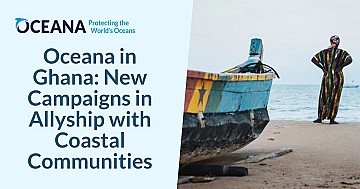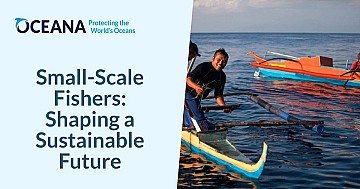September 27, 2024
Where Fish Matter the Most
Nana Kweigyah and his crew venture farther out to sea than Ghana’s fishers did two decades ago — and cast their nets twice as deep. On a good day, Kweigyah, the canoe owner, returns with loads of anchovies, sardinella, mackerel, and other small pelagic fish to be sold at Ghanian markets and served in local dishes. Other days, his nets come up nearly empty.
Colorful canoes like Kweigyah’s saturate the Gulf of Guinea, once a famously fish-filled sea. Like other small-scale fishers around the world, Ghana’s artisanal fishers are spending more time and money catching fewer and fewer fish.
Today over a third of the world’s fish populations are depleted. But the impacts of overfishing aren’t spread evenly. Places where much of the population lives by the sea and relies on fishing for their livelihoods — like West Africa and Southeast Asia — face greater challenges. A tangled story of industrial fishing, local livelihoods, and climate change becomes clearer out on the water, where fishers like Kweigyah see firsthand what’s happening and what’s at stake.
Into the light
Off Ghana’s coast, crews guide long wooden canoes through choppy currents. Hollowed from towering, saltwater-resistant wawa trees, each double-ended boat features unique designs — symbols, proverbs, artwork — that paint a story about its owner. These canoe paintings continue a generations-old tradition, but electrical equipment inside some of the boats tells a more recent story.
A crew lowers a rope into the sea, a 1,000-watt light bulb dangling at the end. Powered by an electric generator, the bulb sirens to small fish with its warm glow. Fishers used to regularly spot fish skimming under the water’s surface. Now they rely on light to find them. Between 1993 and 2019, the amount of small pelagic fish landed in Ghana fell by 42%.
Swept in by the ocean current, a crowd of fish assembles around the light. Fishers plunge their nets into the warm tropical waters. Once rare, “light fishing” has become normal over the past few years, despite being illegal. It’s often accompanied by other illegal fishing methods: chemicals and dynamite, which fishers use to set off explosions that kill fish circling the light.
As the seas grow more depleted, artisanal fishers look to alternative ways of harvesting fish, Kweigyah, who is president of the Canoe and Fishing Gear Owners Association of Ghana, explains — “which has meant more and more practices that are unsustainable for the ocean.” (Kweigyah does not endorse these practices.)
If artisanal fishers are illegally fishing on a small scale, industrial vessels are doing it on a much larger one. “This compounds the plights of artisanal fishers and frustrates efforts aiming to address illegalities in the artisanal sector,” says Kweigyah. Only artisanal fishers have the right to catch small, pelagic fish in Ghana’s nearshore waters, but large commercial fleets continue to capture them. These industrial vessels also hurt fish populations by using illegal nets to catch juvenile fish.
If there’s foreign control of those vessels, matters are even more complicated. Eighty percent of Ghanaian fisheries companies analyzed in a recent report show connections to Chinese ownership. That means that if they’re caught illegally fishing, it’s Ghanian individuals — not the foreign beneficiaries — who pay the price. Powerful businesses based in China can continue illegal operations with little consequence.
Ghana’s government is putting measures in place to slow fishing down before it’s too late. It halted licenses for new canoes. It put a stop to vessels illegally handing off ice-packed fish to local boats. Ghana’s law also prevents foreign vessels and industrial trawlers from securing a license to fish in the large coastal zones reserved for artisanal fishers, though illegal fishing continues.
Meanwhile, out at sea, warmer waters are becoming more turbulent. And they refuse to be regulated.
The tide is coming
Fishers search for writing in the sky to predict the day’s fishing: Clouds might foreshadow a promising catch or empty nets. But as climate change churns the ocean into unpredictable patterns, artisanal fishers’ tried-and-true weather forecasts are failing. The catch depends on the ocean current. And the current grows ever more capricious.
When the ocean current is weak, fish are nowhere to be found. When strong, the current can turn violent, tearing apart fishing nets. “You cast your net and it just folds under the waves,” Kweigyah says. Fishers’ nets are uninsured, he explains, so when they get damaged, fishers take on debt. In the worst cases, the volatile tide takes lives.
Kweigyah and other fishers are working with Ghana’s meteorological agency to better understand the impacts of climate change on the state of the ocean. With the rise of higher tides and stronger storms, they’re establishing early warning systems to save lives. And they’re coordinating to ensure fishers receive weather information about the state of the ocean in their local languages and training community operators to get the word out.
Rising seas are transforming the entire West African coastline. Ghana’s neighbor, Senegal, faces the worst coastal erosion in the region. In 2018, a high-tide event in Senegal displaced 1,500 people.
“Almost 65% of Senegal’s coast is affected by unprecedented sea advances,” explains Senegalese fisher Moustapha Diop, whose family has fished in the village of Thiaroye sur mer, near Dakar, for generations.
More than half of Senegal’s population lives along the coast. As the coastline erodes, so do local livelihoods. That includes the livelihoods of women, who handle the majority of fish processing, marketing, and selling. “They are how fish gets to communities and households,” says Dr. Christina Hicks, an environmental social scientist and Oceana Board Member. “Women hold a lot of knowledge about [their communities’] challenges and opportunities.”
Some 78% of Senegalese fishers and fish processors interviewed by the Environmental Justice Foundation said they found it harder to feed their households compared to five years ago. Many are moving inland. Some fishers decide to leave Senegal altogether, setting off on a treacherous journey across the Atlantic Ocean to find work in Spain.
Climate change isn‘t the only reason fish are few. Senegal’s fishing industry is overcrowded. “The [artisanal fishing] zone has become too small for the 17,000+ officially registered canoes and the very large number of unregistered canoes,” Diop explains.
He also blames foreign fleets that are “scraping fishing resources” and spurring fishers to head to Europe. “Trawlers do not respect the limits, create unfair competition with the canoes, break canoes, destroy nets,” he says — all issues that Diop and others are working to draw public attention to.
Fish shortages send ripples through local economies, notes Oceana Chief Scientist and Senior Vice President Dr. Kathryn Matthews. “If the fisher can’t catch a fish, it can’t be processed by someone. It can’t be sold by someone. It can’t be consumed by someone. So the loss of the initial catch magnifies itself through the entire community,” she says.
Similar ripples are felt by small-scale fishing communities on the other side of the globe.
Fish as food
It’s still dark when Sharifah “Vivi” Hawa heads out to fish northeast of Penang, where skyscrapers overlook one of Malaysia’s oldest fishing villages. Hawa and her fellow fishers navigate while carefully monitoring conditions. A few hours later, they unload fish, shrimp, and crabs into holding pools and storage boxes on shore — some to be sold at market, the rest to cook at home or share with neighbors.
Malaysia boasts one of the highest fish consumption rates in the world. Living in the Tanjung Tokong Fishermen’s Heritage Village, Hawa and her family eat fish almost every day, sometimes frying it in spices, cooking it in a coconut milk curry, roasting it with lime and herbs, or baking it to accompany hot rice and red chili shrimp paste.
“Fish and seafood are the economic and social backbone of my community,” Hawa says. “They are not only a major source of income for many families…fresh fish is a major source of protein for the people here, contributing to a healthy and balanced diet.”
Not all fishing communities reap the health benefits from their catch, however. In her anecdotal interviews with fishers across Malaysia, Dr. Amy Y. Then, a fisheries scientist and Associate Professor at Universiti Malaya, learned that many fishers sell their harvest and buy cheaper protein like chicken.
There’s less fish to go around, fishers told her. Their catches are fewer, smaller in size, and require more effort. Today, Malaysia’s fish populations are just 16% of their levels in 1960, according to government reports.
As fish decline throughout the famously biodiverse Coral Triangle, artisanal fishers in the Philippines are also keeping less of their catch, observes Rhea Yray-Frossard, Oceana’s Campaign and Research Director in the Philippines. That means missing out on fish’s powerful nutritional benefits.
“Fish is a rich source of omega-3s, micronutrients, and protein, especially sardines,” says Yray-Frossard. The nutrients found in fish are particularly important for pregnant and lactating mothers as well as their children, a fact highlighted in an analysis of government data by Oceana and MRAG Asia Pacific. Food security and fish consumption are declining over time, especially in low-income and rural households, a recent nutrition survey in the Philippines revealed.
“Artisanal fishers are the heroes of food security,” says Yray-Frossard. “They provide the sustainable, healthy protein that communities need.”
Oceana is preparing to launch a new campaign in the Philippines, working with artisanal fishers to ensure they reap more benefits from their catch. That means advocating for supplies and facilities that keep fish fresh longer — ice, landing centers, and facilities for fish to be dried and stored — to minimize losses and maximize nutrition.
In Tanjung Tokong, Malaysia, concerned fishers’ associations hold meetings with government authorities to advocate for better storage infrastructure and voice disapproval of the development plans that threaten their way of life. “We hope to ensure the survival of our fishing community and protect the heritage that has been around for centuries,” says Hawa.


